目前的乳房再造方法:对结果和影响核心结果集的因素进行范围审查
IF 2.4
4区 医学
Q3 ONCOLOGY
引用次数: 0
摘要
乳腺癌是全世界妇女中最常见的恶性肿瘤。手术是大多数新乳腺癌患者标准治疗的一部分。手术选择包括保乳手术和乳房切除术。乳房再造术通常用于接受乳房切除术的乳腺癌患者。本综述的目的是评价目前乳房重建的方法和影响乳房重建核心结果集的因素。本综述的重点是通过Medline识别与综述目标相关的关键词,如:“乳房重建”和“乳腺癌”以及“结果”。在2018年7月至2023年7月期间,共有49份相关手稿被确定。此外,我们在文献综述的基础上确定了乳房重建后肿瘤预后的主题。优先考虑最近五年出版的资料来源。现有研究表明,尽管各种手术方法重建后的总体生活质量是相当的,但在术后满意度、并发症和恢复方面存在差异。与植入式重建相比,自体重建通常与更高的患者满意度和身体,心理社会和美学领域的幸福感相关。并发症的主要危险因素包括糖尿病、肥胖和吸烟,它们影响术后恢复和再入院率。此外,乳房切除术后放射治疗对乳腺癌的治疗增加了感染、坏死和审美不满的风险。然而,自体技术受这种风险的影响要小于基于植入物的技术。该综述强调需要加强患者教育工具和基于精确的方法来解决美学和肿瘤方面的问题,为乳房重建中更明智、更有数据支持的决策奠定基础。本文章由计算机程序翻译,如有差异,请以英文原文为准。
Current approaches to breast reconstruction: A scoping review of outcomes and factors influencing core outcome sets
Breast cancer is the most common malignancy among women worldwide. Surgery is part of the standard treatment for most new breast cancer patients. Surgical options include breast conserving surgery and mastectomy. Breast reconstruction is commonly offered to patients undergoing mastectomy for breast cancer. The aim of this review was to evaluate current approaches to breast reconstruction and factors influencing core outcome sets for breast reconstruction. This review focused to identify keywords pertaining to the review aim such as: “breast reconstruction” AND “breast cancer” AND “outcomes” through Medline. There were 49 relevant manuscripts identified between the July 2018 to July 2023. Additionally, we identified based on the literature review manuscripts on topics of oncological outcomes after breast reconstruction. Preference was given to the sources published in the last five years. Available research indicates that although general quality of life post-reconstruction is comparable across surgical methods, variations exist in postoperative satisfaction, complications, and recovery. Autologous reconstruction is often associated with higher patient satisfaction and well-being across physical, psychosocial, and aesthetic domains compared to implant-based reconstruction. Key risk factors for complications include diabetes, obesity, and smoking, which impact postoperative recovery and readmission rates. Additionally, postmastectomy radiation therapy to breast cancer management increases risks of infection, necrosis, and aesthetic dissatisfaction. However, autologous techniques are somewhat less affected of this risk than implant based techniques. The review underscores the need for enhanced patient education tools and precision-based approaches that address both aesthetic and oncological concerns, setting a foundation for more informed, data-supported decision-making in breast reconstruction.
求助全文
通过发布文献求助,成功后即可免费获取论文全文。
去求助
来源期刊

Surgical Oncology-Oxford
医学-外科
CiteScore
4.50
自引率
0.00%
发文量
169
审稿时长
38 days
期刊介绍:
Surgical Oncology is a peer reviewed journal publishing review articles that contribute to the advancement of knowledge in surgical oncology and related fields of interest. Articles represent a spectrum of current technology in oncology research as well as those concerning clinical trials, surgical technique, methods of investigation and patient evaluation. Surgical Oncology publishes comprehensive Reviews that examine individual topics in considerable detail, in addition to editorials and commentaries which focus on selected papers. The journal also publishes special issues which explore topics of interest to surgical oncologists in great detail - outlining recent advancements and providing readers with the most up to date information.
 求助内容:
求助内容: 应助结果提醒方式:
应助结果提醒方式:


